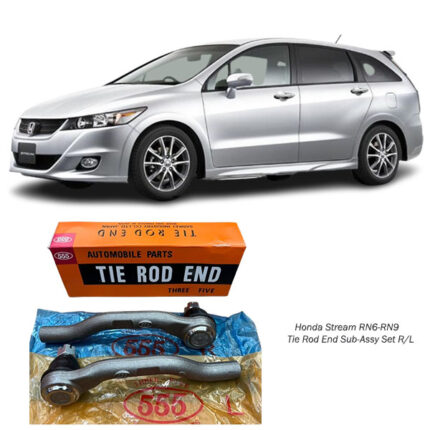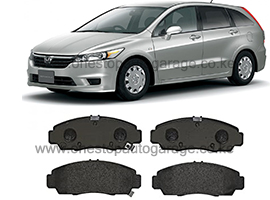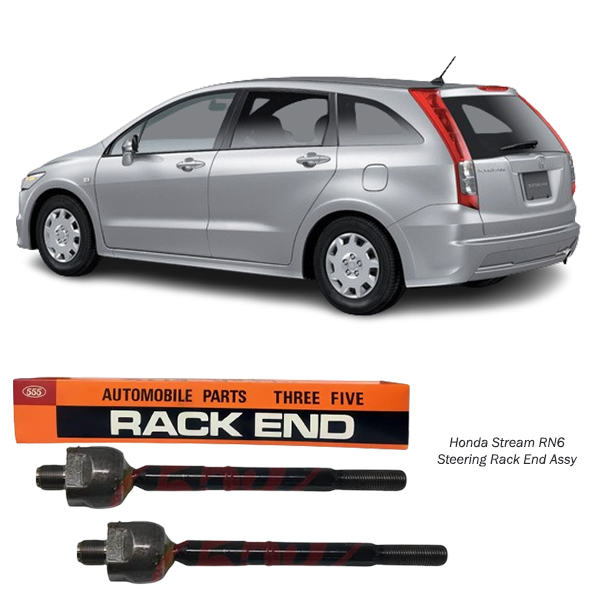-13%
Get Honda Stream RN6 – RN9 Steering Rack End Sub-Assy SRH330
The steering rack end sub-assembly plays a vital role in the steering mechanism of a vehicle. It connects the steering rack to the wheels, allowing for precise control over the direction of the vehicle. This part is integral to the overall functionality and safety of the vehicle’s steering system, ensuring that the wheels respond accurately to the driver’s input. In this detailed breakdown, we’ll explore the function, construction, maintenance, and importance of the steering rack end sub-assembly, as well as how to identify and address common issues.
What is a Steering Rack End Sub-Assembly?
The steering rack end sub-assembly is part of the steering system that connects the steering rack to the steering arms or tie rods. It is usually positioned on either end of the steering rack. The primary role of this component is to allow the movement of the steering wheel to be translated into movement at the wheels, enabling the vehicle to change direction.
The rack and pinion steering mechanism, which is common in most modern vehicles, consists of a gear system that turns the steering wheel’s rotational motion into lateral movement of the wheels. The steering rack end sub-assembly is directly responsible for transferring this motion to the wheels, making it essential for steering precision and safety.
Structure of a Steering Rack End Sub-Assembly
The steering rack end sub-assembly typically consists of the following parts:
- Inner Tie Rod
The inner tie rod is the part that connects directly to the steering rack. It is typically a threaded rod that allows for the adjustment of the steering geometry and ensures that the wheels turn when the steering wheel is rotated. - Outer Tie Rod
The outer tie rod is connected to the inner tie rod and serves as the link between the tie rod assembly and the wheel assembly. It typically connects to the steering knuckle, which is the part that holds the wheel hub. The outer tie rod helps convert the turning motion of the steering wheel into lateral motion for the wheels. - Steering Rack End Joint
The steering rack end joint connects the tie rod to the rack, providing a swivel point that allows for the rotation of the wheel as the steering wheel is turned. This joint usually incorporates a ball joint, which allows for movement while maintaining stability and control. - Dust Boots
Dust boots are rubber coverings that protect the internal components, such as the joints and rods, from dirt, water, and road debris. These boots help to prolong the lifespan of the steering rack end sub-assembly by preventing contaminants from entering and causing wear. - Ball Joints and Bushings
Ball joints and bushings are incorporated to allow for smooth movement while ensuring that the connection between the steering rack and the wheels remains secure. They reduce friction and allow the parts to move freely while absorbing shock from road imperfections.
Functions of the Steering Rack End Sub-Assembly
- Directing the Wheels
The primary function of the steering rack end sub-assembly is to translate the movement from the steering wheel to the wheels. As the driver turns the steering wheel, the steering rack end sub-assembly transmits this motion to the outer tie rods, which in turn move the wheels in the desired direction. - Ensuring Steering Precision
Precision is crucial in steering systems, and the steering rack end sub-assembly plays a key role in ensuring that the wheels respond accurately to the driver’s input. Any sloppiness or play in the steering rack end can lead to a lack of control, affecting the vehicle’s handling. - Allowing Suspension Movement
The steering rack end sub-assembly enables the movement of the suspension, which is crucial when navigating rough terrains or uneven roads. It helps in maintaining the vehicle’s balance while allowing for the necessary flexibility to absorb shocks and bumps. - Maintaining Alignment
The proper alignment of the steering rack end sub-assembly ensures that the vehicle’s wheels are aligned with the rest of the steering system. Poor alignment can lead to premature tire wear, decreased fuel efficiency, and difficulty steering.
Importance of the Steering Rack End Sub-Assembly in Vehicle Performance
- Steering Control
The steering rack end sub-assembly directly influences the responsiveness and accuracy of the vehicle’s steering system. A malfunctioning or worn-out rack end can cause delayed steering responses, making it difficult to steer the vehicle effectively, particularly in emergency situations. - Safety
Given that the steering rack end sub-assembly is integral to the vehicle’s steering, any issues with this component can compromise the driver’s control over the vehicle, potentially leading to accidents. Regular maintenance and timely replacement of worn or damaged steering rack end sub-assemblies are crucial for maintaining steering safety. - Handling and Comfort
Smooth and precise steering is essential for good vehicle handling, which is directly influenced by the condition of the steering rack end sub-assembly. A properly functioning component ensures that the vehicle handles well on a variety of road conditions, contributing to a comfortable driving experience. - Reduced Tire Wear
When the steering rack end sub-assembly is functioning properly, it helps maintain correct wheel alignment. Misalignment caused by a faulty or worn steering rack end can lead to uneven tire wear, which in turn can result in costly tire replacements.
Symptoms of a Failing Steering Rack End Sub-Assembly
Over time, the steering rack end sub-assembly can wear out, leading to various issues that may affect the vehicle’s handling and safety. Below are some common symptoms of a failing steering rack end:
- Loose or Unresponsive Steering
If the steering feels loose or unresponsive, with increased play in the wheel or delayed steering response, it could indicate that the steering rack end sub-assembly is worn out or damaged. - Vibration in the Steering Wheel
A failing steering rack end sub-assembly can cause vibrations or shaking in the steering wheel, especially when driving at higher speeds. This may be caused by worn-out joints or loose components within the steering system. - Clunking or Grinding Noises
Clunking or grinding noises, particularly when turning the steering wheel, are a common sign of a failing steering rack end sub-assembly. This could be caused by worn ball joints or damaged tie rods. - Uneven Tire Wear
As the steering rack end sub-assembly controls the alignment of the wheels, a failing component can cause misalignment, leading to uneven or excessive tire wear. - Difficulty Steering
If you experience difficulty in turning the steering wheel or a sensation of the steering “catching,” it may be a sign that the steering rack end sub-assembly is not functioning correctly.
Causes of Steering Rack End Sub-Assembly Failure
- Wear and Tear
Over time, the components of the steering rack end sub-assembly can naturally wear out due to continuous movement and pressure. This is especially true for vehicles that undergo heavy use, such as those driven on rough roads or used for towing. - Poor Maintenance
Lack of regular maintenance, such as failure to check for and replace worn-out dust boots or grease, can lead to premature failure of the steering rack end sub-assembly. - Corrosion and Rust
Exposure to road salt, water, and other environmental factors can lead to corrosion of the metal parts within the steering rack end, causing premature failure. - Improper Installation
Incorrect installation or improper alignment of the steering rack end sub-assembly can lead to premature wear and failure.
Replacing the Steering Rack End Sub-Assembly
Replacing a worn or damaged steering rack end sub-assembly is essential for ensuring proper vehicle handling and safety. The process typically involves the following steps:
- Lift the Vehicle
Raise the vehicle and ensure it is securely supported with jack stands. This will allow for access to the steering system. - Remove the Old Steering Rack End
Use a wrench or socket set to remove the bolts holding the steering rack end sub-assembly in place. Be sure to disconnect the inner tie rod and any other attached components. - Install the New Steering Rack End
Position the new steering rack end sub-assembly and secure it with bolts. Tighten to the manufacturer’s recommended torque specifications. - Align the Steering System
Once the new rack end is installed, it is crucial to ensure that the steering system is properly aligned. Misalignment can lead to handling problems and uneven tire wear. - Test the Steering System
After installation, test the steering system by turning the wheel and driving the vehicle. Make sure the steering feels smooth and responsive, with no unusual noises or vibrations.
Conclusion
The steering rack end sub-assembly is a critical part of the steering system, ensuring that your vehicle responds to your inputs accurately and safely. Regular maintenance and timely replacement of worn-out components can help prevent steering issues, improve handling, and protect your vehicle from unnecessary wear and tear. If you’re in need of a replacement steering rack end sub-assembly or any other parts, visit OneStop Garage & Auto Spares for high-quality, reliable components to keep your vehicle running smoothly.
Follow us on Facebook for more parts.



